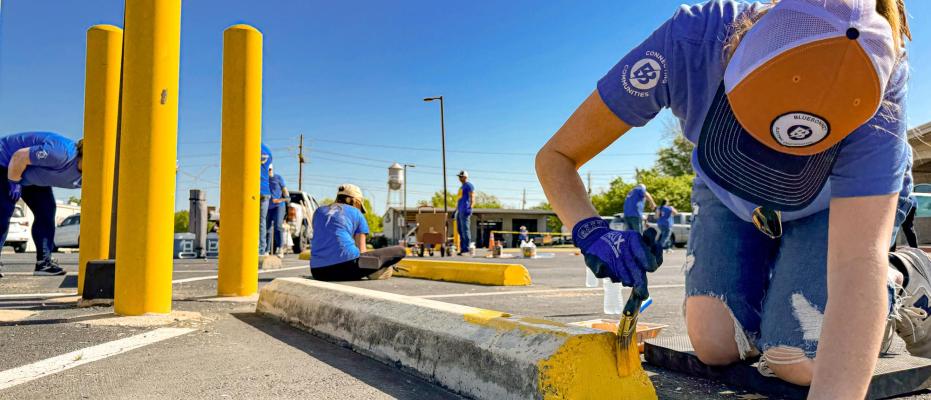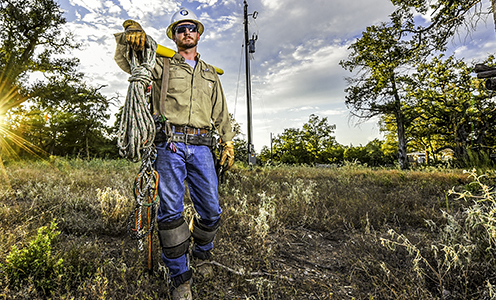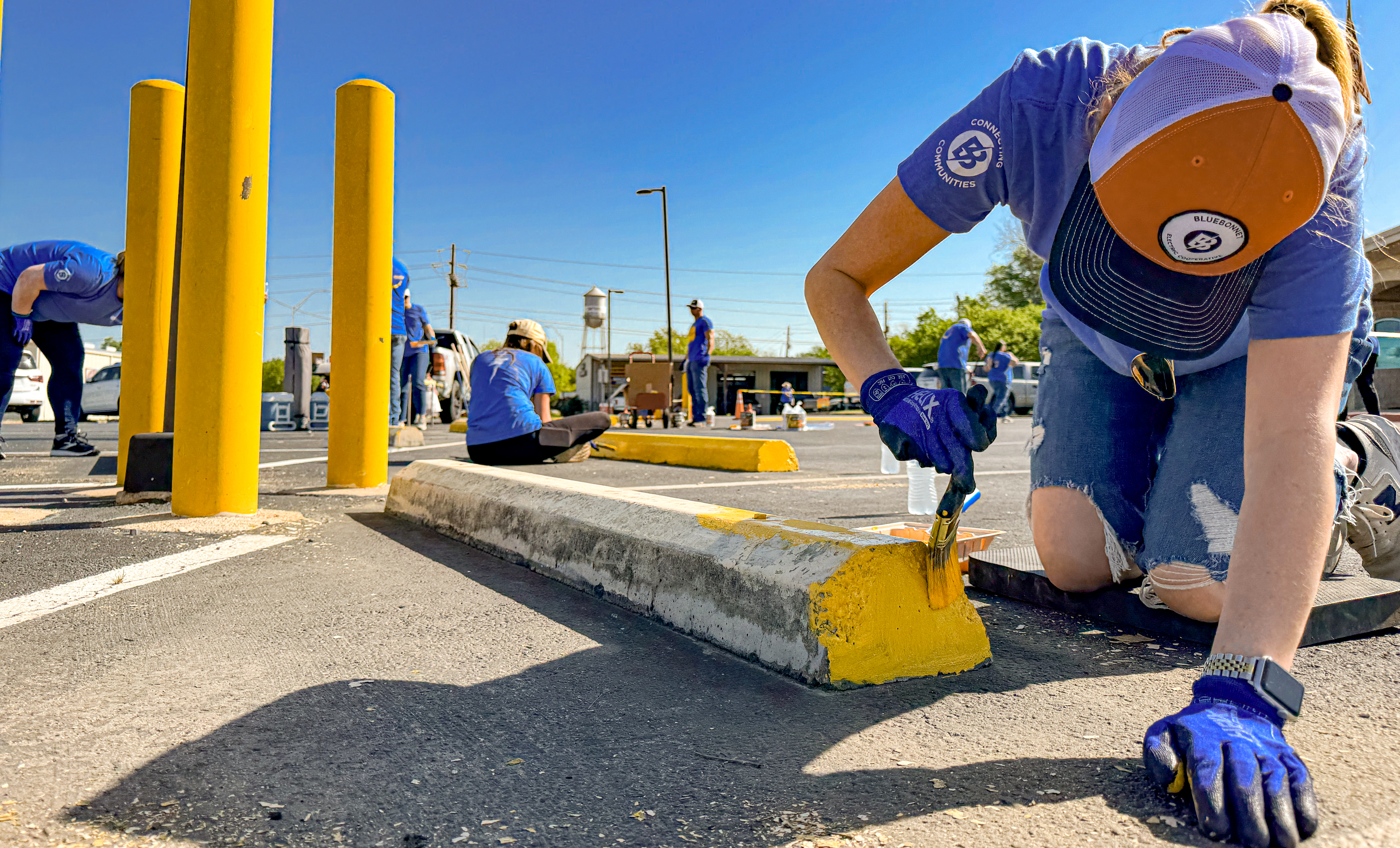We’re your neighbors
Giving back to communities we serve.

Community news
By Melissa Segrest
It started with a stomach bug that most everyone in the family got, around Christmas last year. Everyone got better, but 7-year-old Viviann Snow's stomach pain kept getting worse.
The Rosanky second-grader ended up in an emergency room. A scan showed a mass in her abdomen. A quick biopsy followed at Dell Children’s Medical Center in Austin. On Jan. 29 of this year, a doctor told Kelsey Snow that her only child, her "sunshine in human form," had a neuroblastoma, a rare form of childhood cancer. It was in the tumor and in her blood marrow.
A week later, oncologists at Dell Children’s Blood & Cancer Center started chemotherapy. Vivi, as she’s known by friends and family, was in the hospital for five days.
It was the start of a fight against a form of cancer that usually occurs in much younger children, often infants. As of late July, Viviann had received seven rounds of chemotherapy. Her treatment is led by Dr. Michael Mitchell at Dell. “He has been absolutely amazing throughout this whole thing,” Kelsey Snow said.
Childhood cancer by the numbers
- 483,000 survivors of childhood cancer in the U.S. between 1975-2018
- 15,700 cases of childhood cancer in the U.S. each year
- 1,800 youth younger than 20 are diagnosed with cancer in Texas each year
- 83.5% of families with a child with cancer experience financial hardship
- 4 out of 5 children survive cancer
Sources: cancer.gov, acco.org, dellchildrens.net (statistics vary slightly)
By the second round of chemo, Viviann’s long blonde hair had fallen out. She hated her “pork,” her name for the port implanted near her rib cage where chemotherapy drugs flow into her body. “She has had some challenging hospital stays, where the chemo hit her pretty badly,” her mother said. “She had a bad reaction to one of the chemo drugs, and we ended up being in the hospital for 17 days one time. It just about broke her.” Even FaceTime with her grandmother, Wanda Snow, and her beloved pug, Elvis Pugsley, couldn’t boost her spirits at that time.
Viviann, it seems, is tough. In recent months, she’s pushed through the nerve and joint pain as well as the nausea and vomiting that can come with chemotherapy. She has tolerated the daily shots that come after chemo, and the weekly checkups. Legos, Barbies and snuggles with mom to watch TikTok videos of pugs help.
Sometimes Viviann is reluctant to eat, leading to a self-prescribed, limited diet: Only spaghetti, then only Cinnamon Toast Crunch, then only McDonald’s cheeseburgers. Or just homemade burgers or just chicken nuggets.
Cancer is hard for grown-ups to understand, much less a child. “This is a mistake. I don’t feel like I have cancer. I feel like this medicine makes it worse,” Viviann has cried to her mother. “When will my hair grow back?”
Kelsey Snow has gone from a well-organized working-mom life to a scrambled week-to-week existence. “It’s been an adjustment,” she said. A recent return to her job in Austin at the Seton Mind Institute behavioral sciences program helped restore some order.
Viviann gets support and transportation to medical appointments in Austin from her grandmother and her father, Matt Martin. Kelsey Snow’s sister, Shannon Snow McGovern, has served as a sounding board, support system, meal provider and best friend.
Viviann recently had two days of specialized scans and other tests. “There is no more cancer in her bone marrow,” her mother said happily in late July. The mass in Viviann’s abdomen has shrunk, too, but it’s not gone. Next up is an MRI and then complex surgery to remove the tumor, possibly at Texas Children’s Hospital in Houston or Memorial Sloan Kettering Cancer Center in New York. That will likely be followed by more treatments, possibly radiation, and then lengthy rounds of in-hospital stem cell therapy.
5 common childhood cancers
- LEUKEMIAS, 28% — Cancers of bone marrow and blood
- BRAIN, CENTRAL NERVOUS SYSTEM TUMORS, 26% — About 1 in 4 cancers in children; 4,000+ diagnosed yearly
- LYMPHOMAS, 3% HODGKIN AND 5% NON-HODGKIN — formed in lymph system, including lymph nodes, spleen, thymus, bone marrow or tonsils
- NEUROBLASTOMA, 6% — Most common in children younger than 1 year; about 700 cases diagnosed yearly
- WILMS’ TUMOR, 5% — In kidneys, most common in young children; under 500 cases diagnosed annually in U.S.
Sources: cancer.gov, cancer.org
Family, friends, neighbors and even strangers in and near Rosanky, 13 miles southwest of Smithville, are stepping up to support Viviann, who turned 8 in June. Aunt Shannon and much-loved 6-year-old cousin, Riyann, are next-door neighbors. Grandmother Wanda lives with Viviann and Kelsey Snow. All live on Bastrop County land that has been in the family for generations.
Kelsey Snow has good health insurance, but the cost of Viviann’s treatments are astronomical, she said. Family and friends organized fundraisers and more are planned, including an October music event featuring local talent and perhaps a high-wattage country star.
“The amount of support has blown me away,” Kelsey Snow said. “I’ll see people I don’t even know wearing purple ‘Cancer Picked the Wrong Princess’ T-shirts,” which were sold as part of a fundraiser for Viviann. Cousins and family friends created Vivi’s Villagers benefit fund because “it takes a village.” Donations can be made at any First National Bank of Bastrop or via the Venmo money transfer app to @Vivis-Villagers. Keep up with fundraisers and activities at facebook.com/vivisvillage.
Kelsey Snow balances loving care with firm consistency. “I tell her: ‘It’s OK to be sad. We’re going to have a few minutes to have some cry time, to feel our feelings, and then we’re going to stand up and we’re going to keep going,’ ” she said.
“Ever since she was little, anywhere we would go it would take twice as long as it should because Vivi would talk to everybody, always smiling, always happy, making jokes and meeting people,” her mother said.
“She still has the smile. I don’t know how she does it. Kids are resilient. And she is a fighter, for sure.”
Ronald McDonald House Charities of Central Texas
Ronald McDonald House Charities keeps families with critically ill or injured children together when they are in the hospital, offering complimentary housing in their facility, rooms for rest in hospitals and comfort items delivered to children’s bedside. The Ronald McDonald House offers families who travel from home a place to stay near their child’s hospital. The Ronald McDonald House also provides families with home-cooked meals, laundry facilities and entertainment including video games, playground and a fitness facility.
Ronald McDonald has family rooms, for those to rest at the hospital, while their child is there. They also have a Healing Hearts program, a free six-week bereavement support for families that experience loss. Their Happy Wheel Carts program cruises through hospital halls to bring families drinks, coloring books, toys and toiletries. There are two Ronald McDonald House locations in the Bluebonnet Electric Cooperative region , one in Austin, another in Bryan.
- Since 2018, Bluebonnet Electric Cooperative has donated $5,475 to the Ronald McDonald House Charities of Central Texas
- There were 7,545 overnight stays at the region’s two Ronald McDonald Houses in 2020.
- 699 families in Bluebonnet’s area have been served by a Central Texas Ronald McDonald House
- Families stay, on average, 27.6 days in a Central Texas Ronald McDonald House
- Six Ronald McDonald Family Rooms are available for overnight hospital stays. Four are located in Austin at St. David’s Women Center of Central Texas, Dell Children’s Medical Center, St. David’s Medical Center and Seaton Medial Center Austin. Two family rooms are located in the Brazos Valley area, one at CHI St. Joseph Regional Health Hospital and the other at CHI St. Joseph Health College Station Hospital. Each room can accommodate two or more families.
Helping Kids with Cancer
These are some of the non-profits, groups and organizations nationally, in Texas and regionally, that strive to make life better for kids with cancer and their families.
- A Shelter for Cancer Families, located in Houston, provides families a place to stay and support while their children are receiving cancer care at the Texas Medical Center. To learn more visit cancerfamilies.org, or call 713-497-5365.
- Sunshine Kids, located nationally, with operations out of Houston, provides a variety of local activities and excursions for children while battling cancer. View more information at sunshinekids.org, or call 713-524-1264.
- Heroes for Children, services Texas families, to provide financial and social assistance to provide. The organization hosts events in Houston and Austin to raise money for local families. To get involved, visit heroesforchildren.org, call 832-790-6788 or email info@heroesforchildren.org.
- Project Joy & Hope for Texas, located in Pasadena and serving the Houston area, provides housing and financial assistance for families referred by the Texas Children’s Hospital. The organization also has a 24-hour parent support line, for those that help, beyond housing, when a child is undergoing treatment. To learn more, visit joyandhope.org, call 713-944-6569 or email, info@joyandhope.org.
- Candlelighters Childhood Cancer Family Alliance, with at Texas Children’s Cancer Center and at The Children’s Cancer Hospital at MD Anderson Cancer Center. The organization provides families emotion, educational and practical support. For more information visit candle.org or call 713-270-4700.
- The Children's Blood & Cancer Center of Dell Children's in Austin has multiple resources for children and their families. Beyond care and treatment, they offer patient and family resources to connect with other families and provide educational and support resources. To learn more, visit dellchildrens.net/childrens-blood-and-cancer-center, or call 512-628-1900.
- Ronald McDonald House Charities of Central Texas, serving Austin and Bryan-College Station, provides families a place to stay in a facility, at various hospitals and comfort items and support. For more information, visit rmhc-ctx.org, call 512-472-9844 or email info@rmhc-ctx.org.
- The American Childhood Cancer Organization (ACCO), is a national organization that supports childhood cancer research, awareness and provides educational resources to children and their families. To learn more, visit acco.org or call 855-858-2226.
- American Cancer Society, a national organization, conducts funding and research for cancers of all types. The organization supports patients, provides expert information and spreads knowledge about prevention. For more information, visit cancer.org or call 800-227-2345.
Download this story as it appeared in the Texas Co-op Power magazine »
A $19,583 grant from Bluebonnet Electric Cooperative and the Lower Colorado River Authority will help Martindale Volunteer Fire and Rescue purchase a utility terrain vehicle to assist with river rescues and patient transports.
The Community Development Partnership Program grant, along with $4,896 in matching funds, will provide the department with a reliable rescue vehicle to access areas along the San Marcos River that are hard to reach with standard firetrucks or brush trucks.
“We’re in great need of this type of river rescue UTV, and it will be another great asset for our department,” said Bill Glaze, board president of Martindale Volunteer Fire and Rescue. “We spend about 45 days or more by the river during floating season.”
With about 15 full-time volunteers, Martindale Volunteer Fire and Rescue, formerly known as the Martindale Volunteer Fire Department Company, serves a population of more than 1,270.
The San Marcos River runs alongside the City of Martindale and attracts up to 10,000 visitors per weekend during spring and summer. Martindale Fire has seen an increase over the last three years in river-related calls.
“We use an inflatable boat to rescue people from the river, but the UTV will be used to transport physically injured persons by land to an awaiting ambulance,” Glaze said. “The hardest thing about not having this type of vehicle is first responders can’t get close to the river bottom for rescues. Their brush trucks won’t make it that close and that means patients have to be carried up from the riverbanks to an ambulance by hand.”
Glaze said the bed of the UTV will have room for a stretcher and a medical technician who will ride in the back during patient transports. The vehicle also has ample storage for medical equipment such as water rescue gear and automated external defibrillators.
“This grant has been a real blessing to us for sure and we appreciate LCRA,” he said. “Although we won’t get the truck until after the floating season begins, everyone is very excited about it and we’ll put it to work immediately.”
The community grant is one of seven grants being awarded by Bluebonnet and the LCRA through LCRA’s Community Development Partnership Program, which helps volunteer fire departments, local governments, emergency responders and nonprofit organizations fund capital improvement projects in LCRA’s wholesale electric, water and transmission service areas. The program is part of LCRA’s effort to give back to the communities it serves. Bluebonnet Electric Cooperative is one of LCRA’s wholesale electric customers and is a partner in the grant program.
Applications for the next round of grants will be accepted in July. More information is available at lcra.org/cdpp.
A $18,300 grant from Bluebonnet Electric Cooperative and the Lower Colorado River Authority will help the newly incorporated City of Ellinger establish its first city hall.
The Community Development Partnership grant, paired with matching funds of $4,575, will allow the Fayette County community of about 200 residents to purchase a portable building to house city records and act as a hub for city-related business. The grant also will cover the costs of creating a gravel pad for the building, establishing electrical service to it and making the site accessible to disabled visitors.
“We can’t keep city records effectively in our own houses,” said City Commissioner Joseph Lamer, who was elected in November when voters approved incorporating Ellinger as a Type C municipality governed by a mayor and two commissioners. “We’ve got to keep the paperwork somewhere and have a place where people can come in and access the information. This building will function as a meeting place and a source of information for our residents. I think it gives the city a home.”
Lamer said the new city hall will include desks for him – he’s also the city secretary – and fellow commissioner Kenneth Stojanik, who also serves as the city treasurer.
“Believe me, if it wasn’t for this grant, we wouldn’t even be talking about a building,” Lamer said. “This is something that’s going to be city hall for 20 or 30 years at least. If we aren’t in there in six months, I’ll be disappointed.”
The community grant is one of seven grants being awarded by Bluebonnet and the LCRA through LCRA’s Community Development Partnership Program, which helps volunteer fire departments, local governments, emergency responders and nonprofit organizations fund capital improvement projects in LCRA’s wholesale electric, water and transmission service areas. The program is part of LCRA’s effort to give back to the communities it serves. Bluebonnet Electric Cooperative is one of LCRA’s wholesale electric customers and is a partner in the grant program.
Applications for the next round of grants will be accepted in July. More information is available at lcra.org/cdpp.




